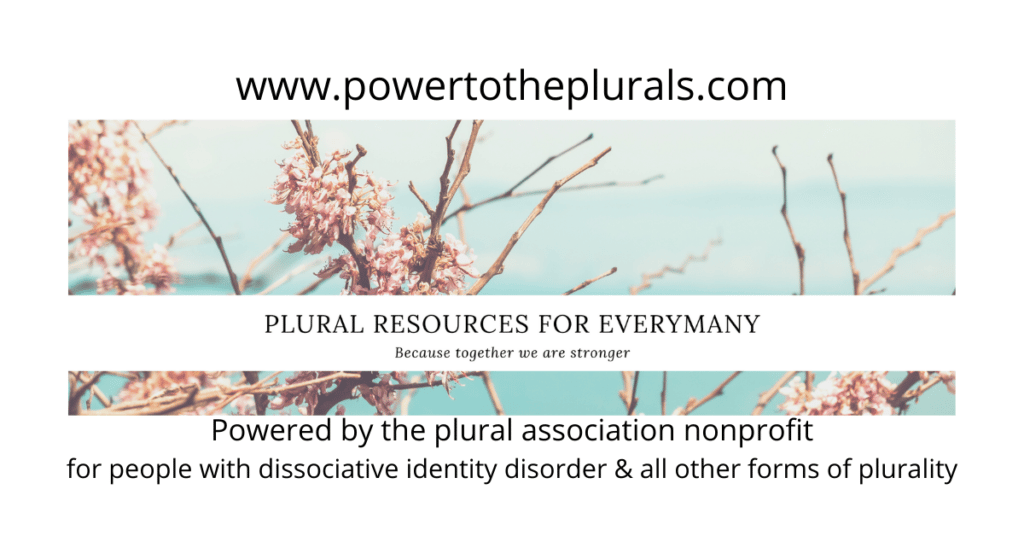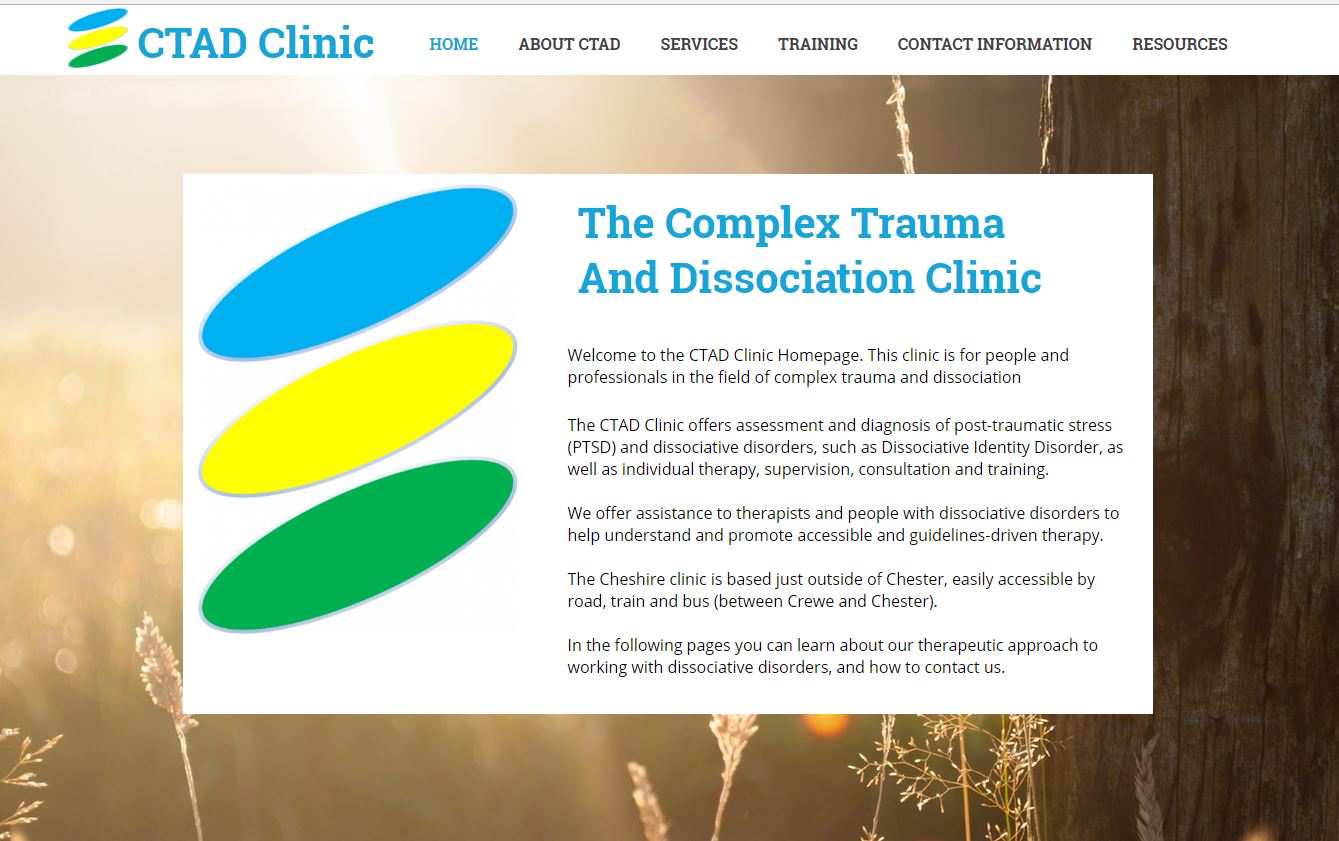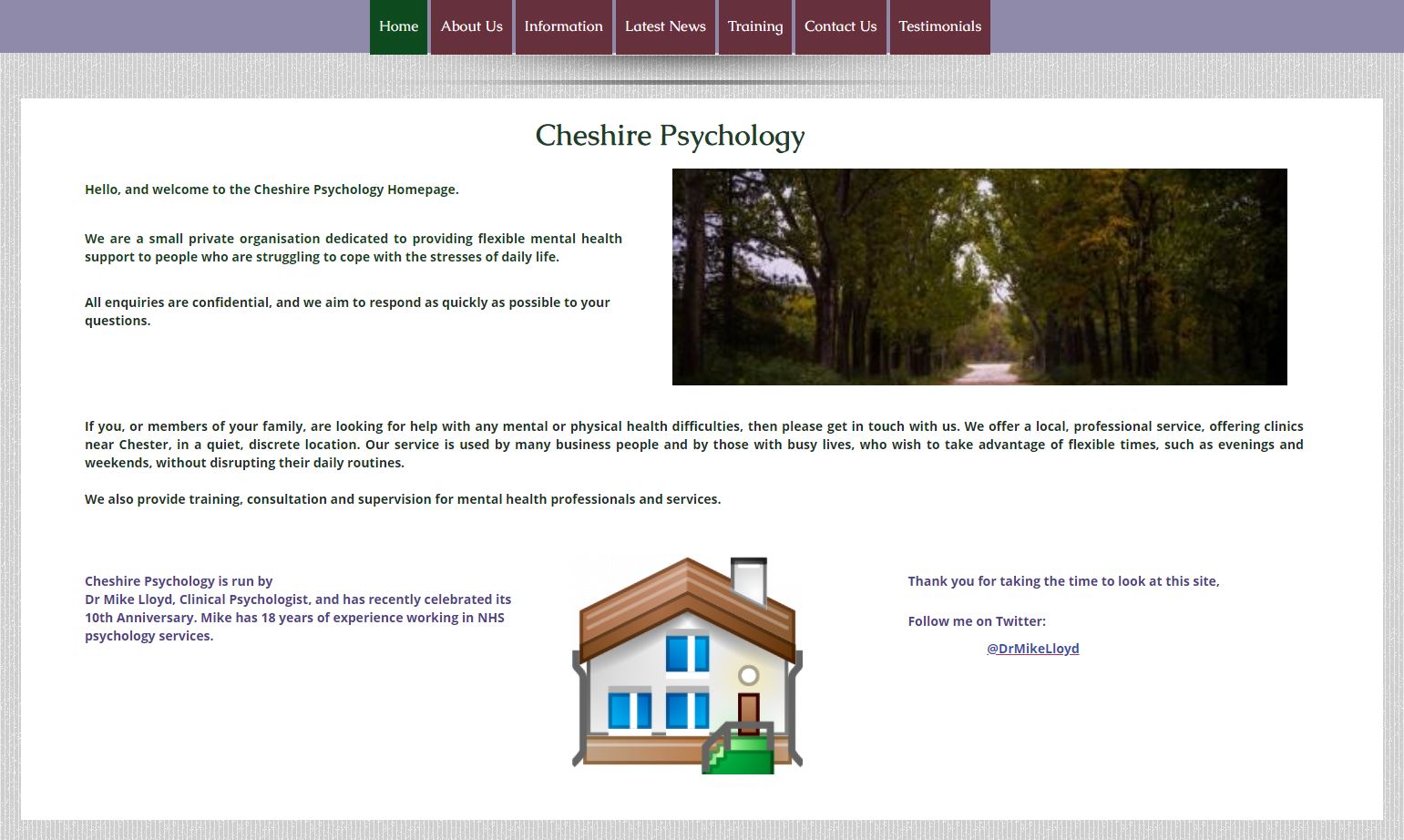|
TPA audio player
|
Thank you Dr. Mike Lloyd for writing this wonderful article.
We hope this article will inspire therapist to find the right training,
to educate themselves and with that be better able to treat their patients,
but also to recognize dissociative symptoms early on. This is a great article,
and we feel extremely thankful Dr. Lloyd took time out of his busy schedule
to write this article for us all. Without further ado:
Table of Contents
Reflections on the need for training
in Dissociative Disorders
By Dr Mike Lloyd B.A., M.Sc., DClinPsych
Director, Cheshire Psychology and The CTAD Clinic
On Facebook: The Complex Trauma and Dissociation Clinic
On Twitter: @DrMikeLloyd
It is always interesting to look back on my UK training in clinical psychology to wonder about how I managed to get through three University courses at Bachelor, Master and Doctorate level, without hearing a single mention of ‘dissociation’. The word ‘trauma’ was used from time to time, but there was never a true focus, more an occasional reference to Post Traumatic Stress Disorder (PTSD). Childhood trauma was considered more in light of safeguarding and raising awareness of the likelihood of a child being abused in some way. The actual treatment of such a child was left to the care of the voluntary or private sector, such as Barnados, or the NSPCC. (National Society for the Prevention of Cruelty to Children).
The situation then did not improve once I got into clinical practice, starting out as a clinical psychologist in a Child and Adolescent community mental health team. We assessed and treated whatever we could, trying not to stigmatise children with mental health or developmental disorders. The emphasis was on safe management and enabling the child / teenager to have as good a life as possible, while supporting parents, carers and educational systems. Again, no dissociation. Each time I run a training event for complex trauma and dissociation people participating say they begin ‘seeing’ the dissociation in the children and adults they knew years before. Having the training “illuminates” the previous lack of awareness and understanding of dissociation. I get told “if I had known this then, everything could have been different”. And I agree, for I did the same when I got trained in dissociation.
Being trained is a complex matter, because realistically nobody attending a formal training course in complex trauma and dissociation should be unaware of trauma in the first place. Training is not like attending a conference and listening to something interesting, it is deeper, more thought-provoking, more challenging. The hope is that training lasts, and the new knowledge gradually seeps into everyday clinical practice gently and smoothly.
My first training in dissociation came six weeks after starting therapeutic work with an adult with Dissociative Identity Disorder (DID), so I already had an idea what I was seeing. Dissociation in that clinical space, with that person, was frequent, and I soon got used to spotting episodes of dissociation, and a feel for the tactics needed to manage situations safely. Perhaps my background in working with children and families helped, as the dissociative system I was presented with very much operated like a family, but one where the relationships were hugely problematic. I certainly needed the training when it happened, provided by an experienced Psychoanalytic Psychotherapist called Remy Aquarone, of The Pottergate Centre, and assisted by Melanie Goodwin and Kathryn Livingston of First Person Plural, the UK’s leading exert-by-experience organisation. It was a four day course, and utterly invaluable to me. The messages I learned on those days remain with me still and are echoed as I now provide the training that Remy did.
However, much as they were invaluable, were they absolutely necessary? I am aware that many clinicians provide assessment and therapy without having been on those courses. Being a member of the European Society for Trauma and Dissociation (ESTD), I know that people all over Europe and the world offer therapy and will never have heard of our courses. These people simply learn what they can where they can. There are many different approaches to successful treatment skills for dissociation, and there is no internationally agreed format for what a person must have, and for this I am grateful. People who live with dissociation are unique individuals. They have their own stories, their own histories, and their own systems. Each are different, even with similar characteristics at times. To say that there is one course to fit the needs of everyone is not possible. Approaching a person with dissociation with care, empathy, respect, compassion, interest and honesty are equally important.
The key to helping a person recover from dissociation, whether amnesia, depersonalisation or DID, relies on being a good therapist. It is not so important what the therapist’s initial background is, or what modality they are trained in (for example CBT, DBT, CAT, EMDR etc), provided they watch, listen and learn from every person they offer a service to. I am currently presenting at conferences with a person I used to treat for DID, and we talk about he relationship being the thing that really mattered. Obviously, I agree with this statement, or the presentation would be very odd indeed, but it must also be understood while maintaining the position that the relationship had a foundation of knowledge to begin with. Our therapy together would not have been successful if I had been starting out without knowledge, support and supervision.
Training is just one element of what makes treatment of dissociative disorders successful. It should be supported by contacts with other professionals, reading, hearing the voice of experts-by-experience, mentoring by an experienced clinician and good, regular supervision. I consider myself now to be a specialist in dissociative disorders, but by no means an expert, and I know that there is a great deal I do not yet know. I continue attending conferences and training events to improve my knowledge, and I share what I can. That I started this journey with experience in dissociation was not the most important thing; I believed in dissociation, and I committed to helping the person dissociating in front of me, that was the most important part.
I worked with the first person I saw with DID for seven years and we achieved a great deal, not only in the improvements in quality of life, but in demonstrating that it is actually less expensive to provide services for people with dissociation than ignore them, publishing these results in two papers. (Lloyd, 2011, 2017). The work led to research in the experiences of people admitted to hospital who have dissociation (Parry, Lloyd & Simpson, 2017), as we realised we are unintentionally creating an inpatient system that seems destined to make people who have dissociation worse.
Dissociation is not rare, nor is it very common. It is present at least in the same numbers as schizophrenia, and it is likely to be under-reported, due the shame and guilt underpinning many life-stories of the people who suffer from it. It can be life-saving, as having dissociation as a defence is amazing, and helps us understand what the brain is capable of. The science of dissociation is improving, you only have to look at the work of Bruce Perry, Ellert Nijenhuis, Renee Marks, Suzette Boon, Onno van der Hart, Kathy Steele, Bessel van der Kolk, Janina Fisher and Stephen Porges to see that, so we have much more to learn. All countries will have a population of people who are dissociating, whether in community or hospital-based services, in supermarkets, war zones or schools. Being able to ‘see’ dissociation is absolutely necessary, as many people with it do not know what they have or maybe they cannot remember. They may feel disconnected with society, with their friends and families, they may raise children and work, or they may not. We have to understand what this is in order to help people live their lives properly, and to recover from the disabling elements of dissociation, of which there are many. One of my trainees wrote an article about her experiences first coming to terms with dissociation while on placement with me, and it is a great insight into what can be achieved in a relatively short time span (Wilson & Lloyd, 2015).
Mental Health Services in any country should become more trauma-informed, and they should support therapists, psychologists and counsellors in assessing and treating dissociation. It is a spectrum of disorders with an extremely good prognosis once treatment is established, so the imperative is to reconnect these people with the useful, productive lives they deserve. Training should always be accessible and affordable. I was filmed for First Person Plural’s two training DVDs on dissociation; both are widely available from their website and they help any professional looking for more information and guidance on how to get started. Showing these to commissioners, service managers, psychiatrists, basically anyone in the field and people with dissociation has been enormously helpful in building awareness and understanding of these conditions.
The essential message is this: if you are a trained therapist, no matter what form, you can help a person with dissociation. You may not know all the techniques, strategies and resources available, but if you care enough and you want to help, you will. It takes time, and you can learn as you go along. The therapeutic instinct is as valuable as the knowledge base. There have been plenty of times where I did not know what to do next but was guided by the principle of ‘do the best you can’. It should not be the case that people with dissociation are denied services because the people working do not feel experienced or knowledgeable enough to begin treating. Any professional therapist can read the ISST-D guidelines and work from there. The book “The Haunted Self” will teach you a great deal about structural dissociation, the best framework we have to understand why dissociation does what it does. Get a good supervisor, build the relationship with the person you see and look out for any learning and training you can find. We are currently organising a set of online resources through ESTD-UK, so you don’t even have to leave your room to do it. If you understand trauma, you can understand dissociation; the rest is experience.
Having not heard about dissociation while I was training has made me want to change the situation. I now teach on the North-West UK Clinical Psychology Doctorate courses, I hold training sessions for psychiatrists (in-training and consultant), I run workshops at national conferences, like for ESTD, the British Psychology Society Division of Clinical Psychology and the UK Psychological Trauma Society. More importantly though, I will happily to talk to anyone about dissociation because it is there, it isn’t going away and there is a lot we can do about it. Thanks for reading!
References
ISST-D Guidelines for Treating Dissociative Identity Disorder in Adults: www.ISST-D.orgFirst Person Plural: www.firstpersonplural.org.ukLloyd, M. (2011). How investing in therapeutic services provides a clinical cost saving in the long term. Health Service Journal (online). [Available from: http://www.hsj.co.uk/resource-centre/best-practice/care-pathway-resources/how-investing-in-therapeutic-services-provides-a-clinical-cost-saving-in-the-long-term/5033382.article]
Lloyd, M. (2016) Reducing the cost of dissociative identity disorder: Measuring the effectiveness of specialized treatment by frequency of contacts with mental health services, Journal of Trauma and Dissociation, 17 (3), pp 362-70
Parry, S. L., Lloyd, M. & Simpson, J. (2017) Experiences of therapeutic relationships on hospital wards, dissociation, and making connections, Journal of Trauma and Dissociation, 18:4, 544-558
Wilson, H. & Lloyd, M. (2015) Working clinically with dissociation, Clinical Psychology Forum, 276 (Dec), pp42-45
Van der Hart, O., Nijenhuis, E. & Steele, K (2006) The Haunted Self: Structural Dissociation and the Treatment of Chronic Traumatization (Norton Series on Interpersonal Neurobiology)




Dr. Lloyd, thank you so much for helping to draw attention to this very serious problem and what can be done to address it. I know from first hand experience just how much damage a therapist’s lack of understanding about dissociation, trauma, and specifically, DID, can be. My name is Leyna, and I am the first “other” alter that Doug met when we were 18 years old. For the following nine years, we were passed along from a Christian therapist, to a psychologist, to a psychiatrist and two nurse practitioners, and none of them wanted to believe that we had DID, despite the fact that at least four of us were directly talking to them in therapy sessions. They told me, Leyna (and the other two alters that Doug found out about during that time period, who were also both female) that I was a “delusion” and that I needed to be gotten rid of or merged with Doug if HE was ever going to have a chance at having a “normal” life. Well, that filled me with so much confusion and guilt that I started making small cuts on my fingers just to try to prove to myself that I was a real human being. We ended up spending a week and a half in a behavioral health institute to help me get over that issue, which filled me with more guilt, because Doug didn’t deserve to be put in there when I was the one doing the cutting. Then, after nine LONG years of being misdiagnosed, we FINALLY met a therapist who knew what DID was and how to properly treat it. And even though our system started seeming to get larger as we “found” more and more of the alters that we previously didn’t know about, we still made more progress in true healing in the first six months with this therapist than the previous nine years combined!!! Our therapist has told us that there is a huge lack of proper training in dissociation and trauma in universities, and that he pretty much had to train himself on the job while treating his first DID client. He went on to help many, many more DID clients, including us, and even led a DID support group that we were a part of (well, several parts of LOL) for a while. I think this lack of available education on dissociation and trauma is deplorable, because it is damaging millions of people who have already been damaged by severe physical, sexual and emotional abuse. I applaud you for trying to call attention to it, and I will try to share your article about it as much as I can! Thank you SO much, Leyna Vincent
Thank you so much for your comment! We have similar experiences, although we have not yet found the understanding therapist. We are very thankful Dr Lloyd took time out of his busy schedule to write this. We (Power to the Systems) are currently reaching out to more specialists in the field, to stand up together with us and get the specialized mental health in each country to understand and treat DID with proper training! After 25 years its about time… Thank you so much Leyna Vincent, for sharing so openly!
I am so pleased this article meant something to you, Leyna, and thank you for sharing your story. It is familiar, sadly, though hearing you have found someone who understands and is willingly ng to learn how to help you has cheered me up!
Take care,
Mike
You’re welcome, and thank YOU for all you are doing to help educate about DID! You’re right, it’s about time that we were more understood! We have been trying to do what we can to educate people online, but unfortunately, our reach is very limited. But still, each person who understands DID a little better is one less person who will believe Hollywood’s lies about us, right? We really appreciate what you and Dr. Lloyd are doing. Thank you very much. – Leyna
Thank you Dr Mike Lloyd for your progressive approach and for remaining curious and open . Keep on. You are truely appreciated and as you know your work is more far reaching than just the individuals you treat. It is the relationship and seeing the person . Thank you for seeing the person , all parts and not stopping learning . It fills me with happiness and hope that you speak the words you do. Wish you all the best . Lydia
Thank you for your comment Lydia. We also hope this reaches many therapists and students in the field!
When someone writes an post he/she retains the plan of a user
in his/her mind that how a user can know it. So that’s why this post is great.
Thanks!
I enjoy what you guys tend to be up too. This kind of clever work and reporting! Keep up the very good works guys I’ve incorporated you guys to my own blogroll.